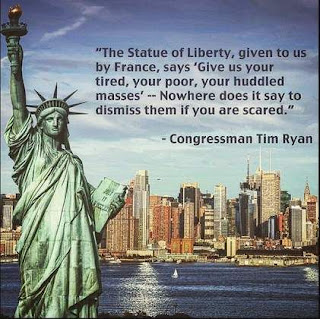Borderland theory: definitions? Imagery? Consider: Borders as permeable.....barriers, bridges: functionality of borders? Colonialism? Constructs? Political? Thoughts? Identities? Insurgency? Resistance?
“A borderland is a vague and undetermined place created by the emotional residue of an unnatural boundary. It is in a constant state of transition” (Anzaldúa).
My grandfather, the one who marched with Cesar Chavez, was not an immigrant. He was born in Texas. His wife, my grandmother, was born in Mexico and crossed the border when she was a minor. There was no "border crossing" lined with American and Mexican flags. No one asked them what they had in their bags as they entered the U.S. They walked hundreds of miles through Mexico. They paid coyotes as they needed, to get them through some parts. They crossed the streets or bridges and that was that. In the U.S., she became a wife, mother, and for decades, she ran the only grocery store in my mom's hometown.
I'll never use the term "Illegal" when referring to the undocumented community. No human being is illegal.
My family roots are in the RGV (Rio Grande Valley). My mom and her siblings were all born there. A quick car ride and they were in Mexico. I can remember taking the same roads they traveled when I would visit. Every summer break, I would live in the RGV with my cousins. Someone always went to Mexico at least once a week. I usually went with them. I loved the shopping, dining, music, language. I always came back with bags full of gifts, collectibles and the pina lollipops.
My first year of high school, my parents traveled to Cancun. I stayed in the states with a family friend so I could go to camp. My white, U.S. Navy enlisted father + my dark skinned, Mexican - American, Public High School Counselor mother, were detained upon their return home. They wanted more documentation proving that my mother was not an undocumented immigrant trying to get into the U.S. My uncle in the U.S. was at the time, a county commissioner in the county where my mom was born. Because of him, my parents were able to return to the U.S. a week after they were expected back. This experience gave me insight as to what some people might go through if they don't look "American enough".
A couple of years after I graduated from high school, my mom and I went to a funeral in the RGV. At the checkpoint, I was pulled over and both my mom and myself were asked to step out of the car. I was handcuffed and stood at the back of the car while they searched my vehicle with my permission. My mom was not cuffed but she was questioned. They thought I was smuggling an undocumented immigrant. My mom.
The anti-immigrant rhetoric is real. We don't visit the RGV anymore.
The border for me can trigger a range of emotions for me. Every time I see something about the border on the news or social media, whatever it is, I am briefly flooded with the good memories of my childhood, the memories of a parent being denied her initial return flight home, followed by what happened at the checkpoint. I often pull up my social media & send my best friend, a program administrator for a major hospital in DFW, the latest news with my colorful commentary. She too, is an immigrant; brought to the U.S. as a pre-teen. She'll be a citizen by the end of this year.
I am a descendant of an immigrant. Everything is political. As a country, as a collective, we must do better for the undocumented community. I wouldn't be here without them. At the end of the day, I'd rather be excluded for who I include, than be included for who I exclude.
Anzaldúa, G. (1999). Borderlands: la frontera: The new mestiza. San Francisco, CA: Aunt Lute Books.

Comments
Post a Comment